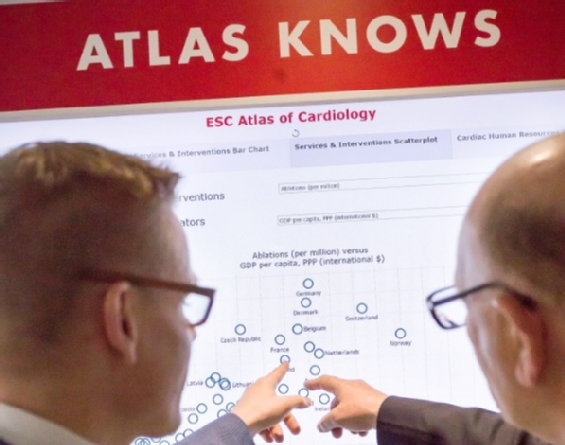The Atlas in Interventional Cardiology provides ESC National Cardiac Societies with the tools that will enable them to:
- compare their situation in terms of interventional cardiology practice to other European countries.
- use that information with their payers, the regulatory bodies in their own countries in order to get some changes in reimbursement policies.
The data collection started in 2016 and will be repeated every two years. The first edition with 2016 data was released in 2018. It offers a unique opportunity to monitor trends and identify the changes in therapy adoption. This project is an important landmark, a reference we can use and to which we can compare our practice day by day.
Objectives
The objectives of the Atlas in Interventional Cardiologyare to:
- Track possible discrepancies in therapies across Europe
- Detect possible differences in quality of care
- Point out any difficulties in implementing the recommendations coming from national interventional cardiology societies
The first edition
The first edition of the Atlas in Interventional Cardiology was developed under the supervision of Prof. Emanuele Barbato, EAPCI Board member and Chair of the 2016-2018 EAPCI National Cardiac Societies and International Affairs Committee. The data was gathered in 2016 by interventional cardiologists in 16 ESC countries: Belgium, Denmark, Egypt, France, Germany, Greece, Italy, Netherlands, Poland, Romania, Slovenia, Spain, Sweden, Switzerland, Turkey and the United Kingdom.
This first report, published in 2020, reveals the human resources, infrastructure and procedure volumes.
Prof. Emanuele Barbato, said “The data show a wide range of available infrastructure and staff, and therefore numbers of procedures. The heterogeneity was linked with national economic resource, which likely reflects the costs of technology needed for these services.”
He added: “The links between national income and infrastructure, procedure rates, and outcomes were striking. But not all of the variation could be explained by national wealth. For example, Turkey, like Egypt and Romania, is a middle-income country but had twice as many interventional cardiologists per million people as the UK. This suggests that the effective delivery of interventional healthcare also relies on its prioritisation by policymakers.”
He concluded: “We hope this report provides the impetus for countries to allocate resources to diagnose and treat cardiovascular disease, which remains a major cause of disability and premature death.”
Check the webinar dedicated to the Atlas in Interventional Cardiology organised on 9 July 2020.



 Our mission: To reduce the burden of cardiovascular disease.
Our mission: To reduce the burden of cardiovascular disease.